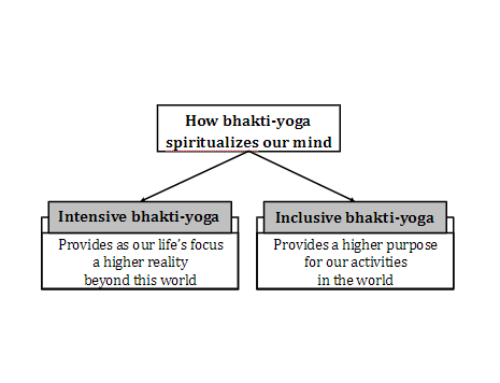Some people claim, “Work is worship. So says the Bhagavad-gita.”
Does it?
The Gita verse that directly links work with worship is 18.46: sva-karmana tam abhyarca. “By one’s own work, worship that person.” This verse explicitly identifies that person – the being from whom the whole creation has emanated and by whom it is pervaded. That unambiguously refers to Krishna, not to work.
Though Gita wisdom doesn’t exalt work itself to worship, it doesn’t neglect work either; it integrates work into a life of worship. Central to this integration is the universalist understanding of Krishna as the source and sustainer of everything. Because Krishna subsumes all of reality, when we make him our object of worship, then our devotional consciousness expands to include more and more of reality. We do everything, including our occupation, responsibly because our devotion enables us to see all of existence as a potential arena for serving Krishna. This vision improves our occupational effectiveness because we learn to stay emotionally engaged without becoming emotionally entangled – we strive to do the work well for the pleasure of Krishna, but don’t go up and down with its ups and downs, for our inner Krishna-connection keeps us stable.
This emotional balance is disrupted by the exaltation of work itself into worship. Such misinformed zeal locks people into their arena of work – a tiny fragment of reality. Their preoccupation with occupation distorts them into workaholics who neglect, even ruin, their spirituality, family and health.
How do we integrate our work with our worship?
By practicing bhakti-yoga. Only when we devote time for exclusively worshiping Krishna will our consciousness become tuned to perceive his connection with our work. Then our work will become a part of our worship – and will take us closer to the object of worship, the source of supreme and eternal fulfillment.
Bhagavad Gita Chapter 18 Text 46
“By worship of the Lord, who is the source of all beings and who is all-pervading, a man can attain perfection through performing his own work.”


Leave A Comment